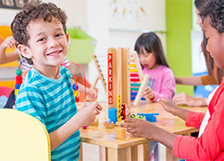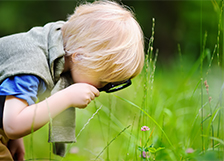In this section
Community partners and professionals
- Child abuse prevention
- Child Advocacy and Protection Services (CAPS)
- Child Welfare Services
- Memberships and accreditation
- Child well-being: Strong Families, Thriving Children
- Resources for schools
- Nutrition ages 2 to 4
- Nutrition ages 5 to 12
- Nutrition 13 and up
- Physical activity ages 2 to 4
- Physical activity ages 5 to 12
- Physical activity 13 and up
- Healthy minds ages 2 to 4
- Healthy minds ages 5 to 12
- Healthy minds 13 and up
Physical activity-ages 2 to 4
These short activities, information on developmental milestones and ideas for keeping your family moving can help your family stay active and healthy.
Fitness for younger kids
How much activity do preschoolers need?

It's recommended that families follow the following daily guidelines for preschoolers:
- At least 60 minutes of adult-led structured physical activity throughout the day
- At least 60 minutes of unstructured or free play physical activity
- No more than 1 hour of inactivity at a time, unless they are sleeping
Ideas for structured play or structured physical activity include:
- Balancing a bean bag on your head while walking
- Have a dance party, and when the music turns off everyone has to freeze
- Using paper airplanes to practice throwing
- Playing bounce catch
While some organized sports or activities allow 4 year olds to participate, it's not recommended until they are a bit older. Preschoolers may not have the attention span, skills or coordination required. If you do enroll your preschooler, make sure the focus of the sport is working on physical skills such as balance, running, taking turns and learning to follow rules.
Unstructured play
This type of activity is recommended for toddlers and preschoolers and it's important for their growth and development. Allow them to choose from a variety of activities that will let them explore, work on new skills and help them learn to balance.
At this age, kids are paying a lot of attention to what others in their family are doing. Be sure to set a good example by moving and exercising regularly as this will encourage your child to be physically active as well.
Also, make sure to talk to your child about street safety, especially when playing outside. Let them know they shouldn't run into the street after a ball and to get an adult when they need help.
Motivating kids to be active
There are three main ways to encourage kids to be active:
- Pick activities that are right for the child's age and development level. If something is too easy, kids may get bored or they may become frustrated if the activity is too difficult.
- Give them a lot of opportunities to be active. Make it easy for kids to be physically active by taking them to playgrounds or parks.
- Keep things fun. If kids aren't enjoying what they're doing, they will lose interest and they won't do it for long.
Learning and exploring
Helping toddlers explore

During this stage of development, it's important to let toddlers explore new environments in a safe and supervised way. Exploring fits into the free-play category, and it's recommended that kids 12-36 months get at least:
- 30 minutes of adult-let structured physical activity
- 60 minutes of unstructured physical activity, or free play
Some ideas for indoor exploration include:
- Practice new skills, like having them walk backwards or on their tiptoes. You can also imitate animals by jumping like a rabbit, walking like an elephant, or you can dance to music.
- Using tactile toys that use their sense of touch. These things can be squeezed, patted, poked, and prodded
- Climbing stairs can be fun for toddlers, but make sure you're with them and that you replace gates afterwards.
Some ideas of outdoor exploring include:
- Let your child explore by learning to kick, throw and even catch balls.
- Check out nature in your own yard or neighborhood by encouraging your child to pick up leaves or rocks and by touching grass or trees.
Developing motor skills for preschoolers
Preschoolers develop new motor skills as they learn and grow, and it's important that you help them practice. Some of these skills can include:
- Hopping or jumping
- Rolling or skipping
- Balancing on one foot
To help them work on these skills, incorporate them into activities you already do as a family. Some ideas include:
- Mix walking with hopping, jogging, walking backwards, and racing to help them practice new types of movement
- Practice balancing by having contests like who can stand on one foot the longest
- Turn your family walk into a scavenger hunt
Physical activity resources
Resources and online activities
- Learn about health facts for your 2 to 3 year olds | En Espanol
- Learn about health facts for your 4 to 5 year olds
- Visit this Kids Health webpage to learn more about nutrition and fitness.
